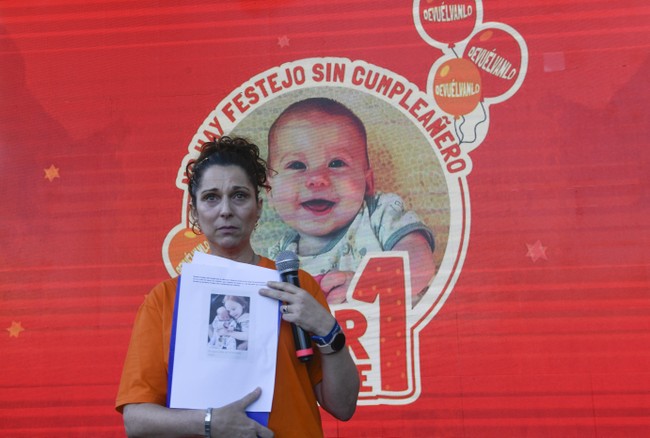Tragic Handover: Hostage Bodies Returned Amid Tensions
In the midst of a fragile ceasefire, Hamas returns the bodies of Israeli hostages, rekindling grief and outrage as families and nations grapple with the aftermath.
Published February 21, 2025 - 00:02am

Image recovered from washingtonexaminer.com
In a move that has stirred profound emotions and international reactions, Hamas handed over the bodies of four Israeli hostages. This grim handover included the remains of Shiri Bibas and her two young children, Ariel, aged four, and Kfir, barely nine months old, along with 83-year-old Oded Lifshitz, an elderly journalist. The transfer of the bodies has marked the first such return during the tenuous ceasefire brokered last month between Israel and the Palestinian militant group, with the mediation efforts of Qatar, Egypt, and the United States.
The handover ceremony, carried out in Gaza, was marred by provocative displays intended for propaganda. Coffins were paraded before crowds under banners depicting Israeli Prime Minister Benjamin Netanyahu in a caricature of a vampire, with blood suggestively dripping from his mouth. These banners provocatively accused Netanyahu and his forces of causing the deaths through airstrikes, framing it as an American-assisted operation. Such depictions have only served to deepen the chasm of distrust and hostility, drawing sharp condemnations from international bodies, including the United Nations, which emphasized the importance of handling the deceased's remains with dignity and respect.
Prime Minister Netanyahu condemned the display and promised that Israel would pursue justice against those responsible for the killings. His pledge struck a chord with many Israelis, who are grappling with the magnitude of loss from the recent surge in violence. Meanwhile, Israeli President Isaac Herzog extended apologies to the families of the victims and the entire nation, acknowledging the state's failure to protect and return the hostages alive.
The hostages, originally captured during Hamas's audacious attack on October 7, which also saw the deaths of approximately 1,200 Israelis, have become symbols of national trauma. The harrowing abduction of the Bibas family from Kibbutz Nir Oz, captured on video, had seared a graphic and haunting image into the public consciousness. The mother, Shiri Bibas, was seen desperately shielding her young boys as they were forcefully taken away.
Yarden Bibas, Shiri's husband, and the father of Ariel and Kfir, was released in an earlier hostage exchange but had maintained hope for his family's safety until the tragic news of their deaths was confirmed. The extended Bibas family has been active in advocating for hostage returns, emblematic of the larger Israeli outcry against the perceived inactionor inadequacy of governmental efforts to resolve the hostage crisis.
Internationally, the ceasefire agreement, which includes the return of hostages in exchange for the release of Palestinian prisoners, is seen as a fragile lifeline amid a costly conflict that has left Gaza heavily devastated. Palestinian health authorities in Gaza report staggering casualties, describing over 46,000 Palestinian deaths and more than 110,000 injured since the conflict flared anew.
The volatile political environment in the region remains fragile. Critics of Netanyahu, particularly from his far-right coalition allies, chastised him for agreeing to what they consider a too-conciliatory ceasefire agreement. Yet, public sentiment in Israel generally supports the cessation of hostilities, with the urgency of bringing home the remaining hostages driving public demonstrations.
As tensions persist, negotiations are set to advance into a second phase focusing on the potential return of further hostages and a potential resolution toward peace, though challenges such as governance issues in Gaza complicate these discussions. The call from some quarters, including by former U.S. President Donald Trump, suggesting resettling Palestinians outside Gaza has drawn criticism and concerns over potential breaches of international law.
Amidst ongoing friction, the demands for a resolution that respects human dignity and justice continue to resonate. Families like that of the Bibas face an arduous path towards closure, as they grapple not only with unfathomable personal losses but with the broader geopolitical machinations that underscore and prolong the human suffering witnessed.







